|
In the introduction to my review of the 2012 Masters of Cinema Blu-ray release of The Testament of Dr. Mabuse [Das Testament des Dr. Mabuse], I noted that it seemed a little odd to be releasing the second part of a famed trilogy on Blu-ray before the first. I also theorised that this decision was likely dictated by the availability of the restoration in question. Think about it for a second. A lovely HD restoration of a truly great film is made available, one you have the UK home video rights to. What do you do? Release it or sit on it until a similar HD restoration of the first film appears? Assuming it eventually does, of course. Well just over a year later, here we are, and Dr. Mabuse, der Spieler, or Dr. Mabuse, the Gambler if you prefer the translation, has finally arrived on UK Blu-ray.
There's a touch of personal irony to the fact that of the three Fritz Lang Mabuse films, The Testament of Dr. Mabuse was also the one I saw first, caught on TV one fortuitous evening when a night out was cancelled and I had no outstanding tape recordings to catch up on. I was aware of the film but knew little about it, a title from the pages of more interesting film books and the filmography of its rightly celebrated director. Tracking down such a film back in pre-internet VHS days was a Herculean task, yet the more I read about it, the more I wanted to see it. When I did finally catch up with it, fortunately in its fully restored form, it actually surpassed my expectations. Yes, it runs for four-and-a-half hours in total (you did know this, didn't you?), but it has enough plot and character detail and showcase scenes to fully justify that length, and crucially – and I'm sure a few who have never seen it will baulk at this statement – it never feels long. It's also in two parts, so if you really don't fancy dealing with the whole 271 minutes in a single sitting, you can watch it over two evenings as a pair of Hollywood-length features. Frankly, if you can watch part 1 and wait a whole day before tucking in to part 2 then you're a better person than I.
Like so many great German films from the mid to late silent period, Dr. Mabuse, der Spieler, as well as being compelling drama, is also thrillingly cinematic, in its camera placement and editing as much as its acclaimed effects photography. In retrospect this doesn't seem quite so surprising, given that Lang's next two films were the operatic historical fantasy-drama Die Nibelungen and the ground-breaking science fiction epic Metropolis. And if you're looking to chronologically tick of the films that really established Lang as a master of cinema (no pun intended), then Dr. Mabuse, der Spieler is the logical place to start, at least until his 1921 Destiny [Der müde Tod] is restored and makes its way onto UK Blu-ray. Put that one in Eureka's suggestion box.
As is our way with Blu-ray releases of films we have already reviewed in their DVD incarnation, I see no reason to re-review the film or copy the earlier review into the space below. If you don't know Dr. Mabuse, der Spieler then you can read my review of all three of Lang's Mabuse films here.
The question here is whether the film scrubs up any better on Blu-ray than it did on DVD. You'd better believe it...
The restoration used for Eureka's 2009 DVD release was carried out by Berlin's Bundesarchiv-Filmarchiv, the Filmmuseum München and Friedrich-Wilhelm-Murnau-Stiftung. There was some variance in picture quality, the contrast was sometimes on the aggressive side and the image rarely as crisply detailed as the transfer on the Masters of Cinema Blu-ray of Lang's later M, likely a concession to this film's age, the original film stock and the conditions in which the two negatives used for the restoration were stored. But the image quality was still very pleasing and at it's best was seriously impressive.
The same restoration appears to have been used for the transfer here. As with the DVD, a degree of damage and picture instability do remain, but what was good on that disc is even better here, with a noticeably higher level of detail – on the wide shot of the trading floor at the start of chapter 5, the large wall clock whose numbers looked almost like blurred Arabic characters on the DVD are clearly visible as the numbers 1 to 24 on the Blu-ray. A short while later you'll also find a demonstration of the above-mentioned variance in sharpness and tonal range in the space of just two shots, as a high-contrast wide shot of top-hatted traders, where faces are washed-out and lacking in features, gives way to a mid shot in which the black suit of a trader can be seen in all its detail, while the hairs of his beard and the pattern on his tie are crisply captured. The shot that I singled out for the level of its detail in my DVD review, that of Cara Carozza's object-busy dressing room at the start of chapter 7, is even sharper here – the lettering that adorns a wreath that sits on the wall behind Cara's head is an indistinct smudge on the DVD but is distinctly legible on the Blu-ray. One thing you will find on this transfer that you won't have seen on the DVD is film grain, brought to life by the HD resolution but in no way enhanced or artificially sharpened. No question, this is an upgrade from the DVD release – after watching this new transfer, the DVD that I previously championed for its intermittent crispness now feels a little soft by comparison. As with the DVD release, the film has been spread over two discs rather than compressed onto one.
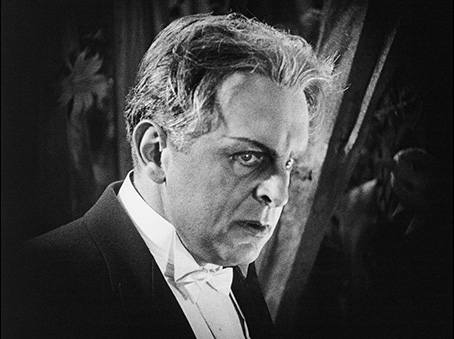
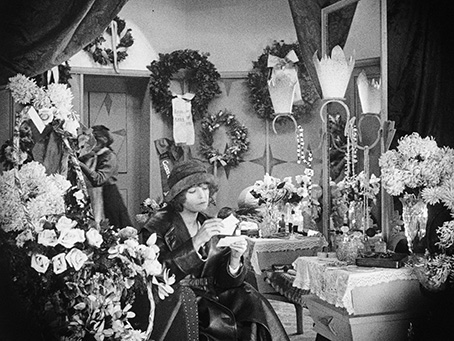
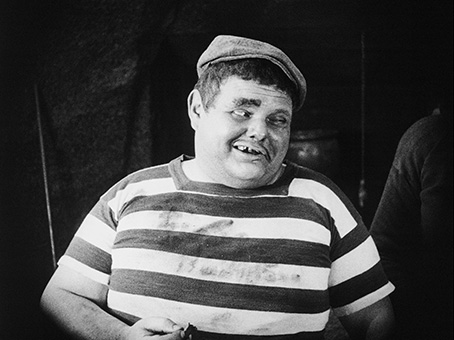
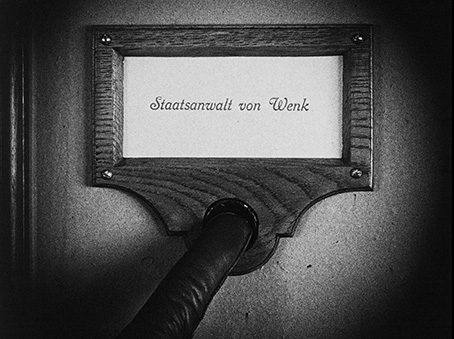
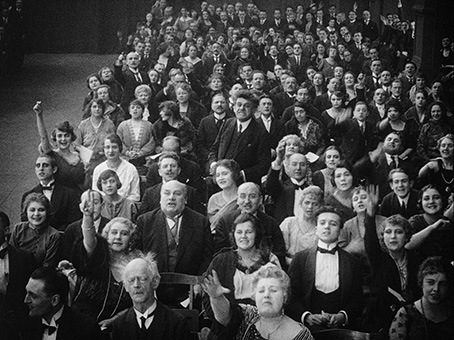
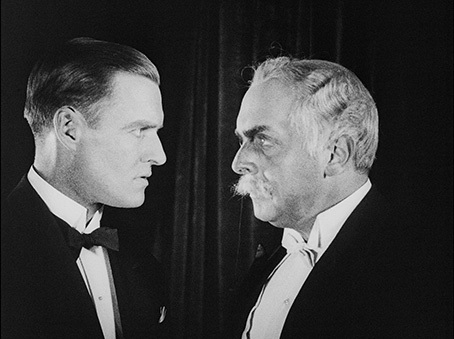
The same orchestral score that accompanied the DVD is also present here, this time presented as an uncompressed Linear PCM stereo track. As a relatively recent recording, the clarity and dynamic range of the track is excellent.
The details below have been adapted from my review of that set.
As with the Blu-ray upgrade of The Testament of Dr. Mabuse, the extra features here have been ported over from the earlier Masters of Cinema Mabuse DVD box set, and if this is to be your first purchase of this film you'll be glad of that.
Commentary
If you're looking for confirmation of the statement above then you'll quickly find it here, when film historian and author David Kalat informs us that his book The Strange Case of Dr. Mabuse examines all of the Dr. Mabuse films, including "the three films by Fritz Lang collected on this DVD set." Either way, this is an essential inclusion and covers a vast amount of ground, including the cuts made by censors for the UK and US releases, the differences from Norbert Jacques' source novel, Lang's influences and the influence this film had on later works, the social background to the production and the story development. Scenes and film techniques are examined, underlying meanings explored, characters analysed and the work of contributors discussed. The events that led to the film's production and the career of author Norbert Jacques are covered in some detail, and other writing on the film is referenced. Kalat takes issue with the idea that the film is in any way expressionistic and at one point commands that we do not call Lang an expressionist, an argument he cuts short before we can get to the director's later Metropolis, one of the true giants of German expressionist cinema. As with the DVD, the commentary is spread over both discs and is consistently fascinating stuff – even if you know the film well you're likely to find plenty to interest you here.
The Music of Dr. Mabuse (12:57)
Composer Aljoscha Zimmermann provides a revealing and – particularly for us non-musicians – fascinating insight into his approach to the composition of the score for this release of the film, with emphasis on specific themes and sequences.
Norbert Jacques: The Literary Inventor of Dr. Mabuse (9:35)
Michael Farin, author of the second series of Mabuse radio plays, provides a brief but useful introduction to author Norbert Jacques and discusses key elements of the first Dr. Mabuse novel, Lang's film version, and the subsequent spin-offs.
Mabuse's Motives (29:55)
An informative analytical documentary produced by Friedrich-Wilhelm-Murnau-Stiftung in 2004 that examines the film and its production, plus its symbolism, motifs, meanings and the social context in which it was made and should be viewed. That Lang was keen for the film not to be seen as expressionistic is reiterated here, and the development of some of film's key elements are traced from and to other film works. Includes some welcome extracts of an archive interview with Lang, which is in startlingly good shape, and brief snippets from Lang's 1919-20 serial The Spiders [Die Spinnen], from which some of the sequences in Mabuse were drawn.
Booklet
At the moment we're in guesswork territory here, as we've not yet seen the booklet that comes with this release. Usually a Masters of Cinema Blu-ray upgrade of a film they've previously released on DVD is accompanied by a slight redesign of the earlier booklet, but with the same contents, which in this case would be no bad thing at all. If it is the same it'll have a 1924 article entitled Kitsch: Sensation Culture and Film by Fritz Lang, a scrapbook of Fritz Lang comments on Dr. Mabuse, der Spieler, credits for the film, and some excellent quality production stills.
If you never got around to getting The Complete Fritz Lang Mabuse DVD Box Set then this is a no-brainer, a standard-setting example of silent crime cinema, looking better than it ever has on home video before and backed up with a fine set of extras. If you do own the DVD set then the decision to upgrade will depend on your fondness for this particular film, and if you're as big a fan as I am then the improvement in picture quality is definitely worth the upgrade. Heartily recommended, and remember that Lang's own terrific sequel, The Testament of Dr. Mabuse, is also available on Masters of Cinema Blu-ray.
|